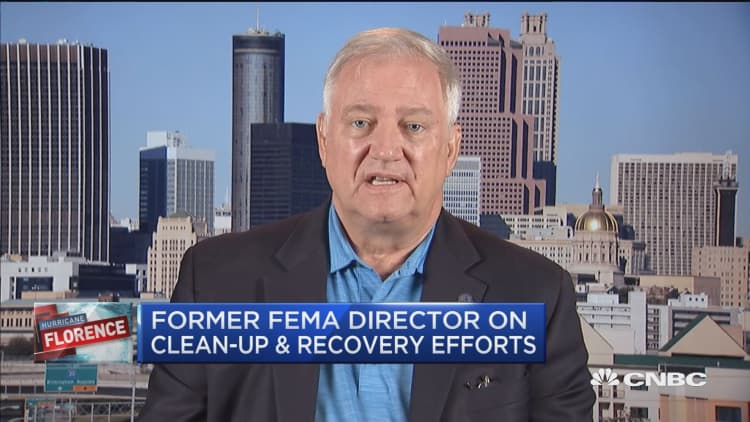
Hurricane Florence and its remnants have weakened, but the worst may be yet to come, John Copenhaver, former Federal Emergency Management Agency Southeast director, told CNBC on Monday.
"It's not safe to say that the worst is over. There's going to continue to be areas where the water will rise, perhaps for a period of several days," Copenhaver said on "Power Lunch."
"Once the water starts to recede, then damage assessments can take place," he added.
Florence has killed at least 17 in the Carolinas, and displaced tens of thousands. The storm has continued to dump rain that has nowhere to go except to swell rivers, flood highways and homes, and threaten more lives as it heads toward Virginia and New England. The National Weather Service predicts flash floods, landslide warnings and "prolonged significant river flooding" throughout the Southeast for the next few days.
Copenhaver, who served Florida and Alabama under President Bill Clinton, said residents of the coastal Carolinas will likely have to adapt to a "new normal."
"The old normal is gone. There have been changes in landscape, because of all the water inundation," Copenhaver said.
One of the first steps to getting back to a semblance of normal is getting the power on, he said.
Duke Energy, which is headquartered in North Carolina and serves about 7.6 million retail electric customers in six states across the Midwest and Southeast, reported about 1.5 million power outages from the storm. As of Monday, Duke said it had restored power to about 1.2 million of those customers.
"It has been an extraordinary storm," Lynn Good, CEO of Duke Energy, said Monday on CNBC's "Closing Bell." "The floodwaters are really impacting the state and many of our customers and has been an important part of the story here with Hurricane Florence."
Good said the company is out in the coastal areas attempting to get a better grasp on what it will take to restore power to the remaining 300,000 customers who are still without it.
"Every hurricane has a different personality to it, or story to unfold, and floodwaters have been an important one here," she added.
All that flooding is likely to be costly, but Copenhaver said cost assessments should come after the basics, like power restoration, trash removal and flood water contamination assessment.
"We shouldn't be jumping the gun trying to figure out how much this will cost us, we should be going through the steps that we know we have to take to begin the recovery process from a major flood. We've done this before," he said.
When it does come down to cost, the impact of the storm could be devastating. FEMA can offer some financial support through its individual assistance program, but that likely won't be enough, even for those with flood insurance, Copenhaver said.
"If they are able to have some reimbursement from the FEMA individual assistance program and from flood insurance, then there is a better chance that they are going to be able to climb back on their feet. But it's going to take a long time," Copenhaver said.
— Reuters contributed to this report.


